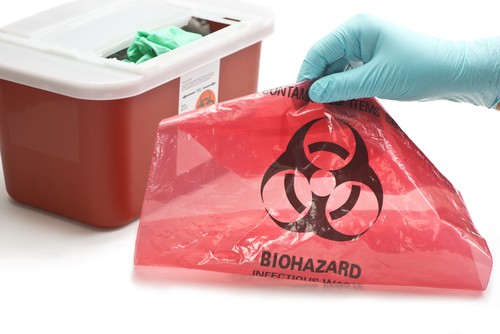Responsible Solutions: Recognizing Medical Garbage Disposal Services
In the world of medical care, the correct disposal of medical waste is a vital aspect that demands mindful consideration. The value of taking care of clinical waste properly goes past plain compliance with laws; it directly affects public health and wellness and ecological safety and security. As health care facilities create different sorts of waste that need customized handling, understanding the nuances of medical waste disposal solutions is critical. By checking out the details of this important process, we can shed light on the ideal methods, benefits of expert solutions, and lasting options readily available.
Importance of Correct Medical Waste Disposal
Correct clinical garbage disposal is important in maintaining a safe and sanitary atmosphere within health care facilities. In healthcare settings, different sorts of waste are produced daily, including infectious products, sharps, ended medications, and chemical substances. Otherwise correctly handled, these wastes can present major risks to both health care workers and the general public. Inappropriate disposal can lead to the spread of infections, injuries from sharps, contamination of water sources, and injury to the environment.

Kinds of Clinical Waste
Within medical care facilities, a varied array of waste materials classified as clinical waste is generated, each requiring details handling and disposal methods. Pathological waste, which includes cells, organs, and body components, demands correct disposal to respect the self-respect of the deceased and protect against any biohazards. Recognizing the different kinds of medical waste is important for healthcare facilities to execute effective waste monitoring techniques and shield public wellness and the environment.
Regulations and Conformity
Healthcare centers should follow strict guidelines concerning the handling and disposal of clinical waste to ensure compliance with legal requirements and protect public wellness. These regulations are established to avoid the spread of infections, secure the atmosphere, and maintain the safety of health care workers and the basic public. Different governing bodies, such as the Epa (EPA), the Occupational Safety and Health Administration (OSHA), and the Division of Transportation (DOT), have particular guidelines that health care facilities need to comply with.
To follow these laws, medical care centers need to properly set apart, shop, transportation, and throw away various kinds of clinical waste. This consists of sharps waste, transmittable waste, hazardous waste, and pharmaceutical waste, each calling for specific dealing with procedures. Facilities has to additionally maintain accurate records of waste generation and disposal to demonstrate conformity during evaluations.
Non-compliance with medical waste regulations can cause extreme fines, penalties, and damages to the center's online reputation. It is necessary for health care facilities to remain notified regarding the most recent laws and execute robust compliance steps to protect public health and the setting.
Benefits of Expert Disposal Services
Involving specialist clinical waste disposal services provides health care centers a trusted and efficient remedy for handling unsafe products. These solutions use experienced experts that are well-versed in handling various types of medical waste, guaranteeing appropriate partition, packaging, transportation, and disposal. Medical Waste Disposal Services.
Additionally, specialist disposal solutions utilize advanced devices and adhere to sector finest practices to reduce ecological influence and reduce the risk of contamination. This not more only advertises a safer work environment for medical care personnel yet additionally adds to total public health and wellness and safety and security. In addition, contracting out clinical garbage disposal can bring about set you back savings in the long run by getting rid of the need for in-house management and disposal systems.
Lasting Practices in Medical Care

One key sustainable method in healthcare is waste reduction. By implementing approaches to reduce unnecessary product packaging, single-use products, and total waste generation, healthcare facilities can dramatically reduce the quantity of waste sent to landfills or incineration. Furthermore, recycling programs for materials like paper, glass, and plastic can even more minimize the ecological influence of healthcare procedures.

Final Thought
To conclude, proper clinical waste disposal is essential in preserving a healthy and balanced and secure atmosphere for both healthcare employees and the basic public. Understanding the different kinds of clinical waste, following laws and compliance standards, and making use of expert disposal solutions are necessary action in liable waste monitoring. By taking on lasting methods in medical care facilities, we can lower environmental influence and make certain the wellness of all people entailed in the health care industry.
As health care centers produce various types of waste that call for specific handling, recognizing the subtleties of clinical waste disposal services is extremely important.Within health care centers, a varied range of waste products identified as clinical waste is created, each needing specific handling and disposal approaches. Understanding the different kinds of clinical waste is important for healthcare facilities to carry out reliable waste monitoring techniques and shield public health and the environment.
By carrying out approaches to decrease unnecessary product packaging, single-use things, and total waste generation, healthcare facilities can substantially lower the quantity of waste sent to garbage dumps or incineration. read review Comprehending the various kinds of medical waste, complying with laws and conformity criteria, and making use of professional disposal services are important steps in accountable waste management.